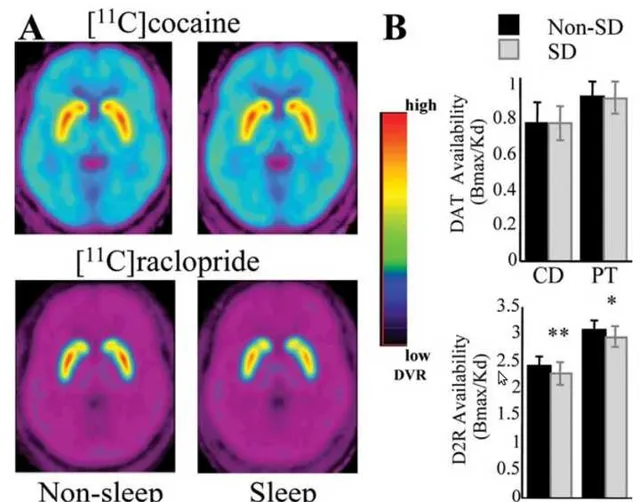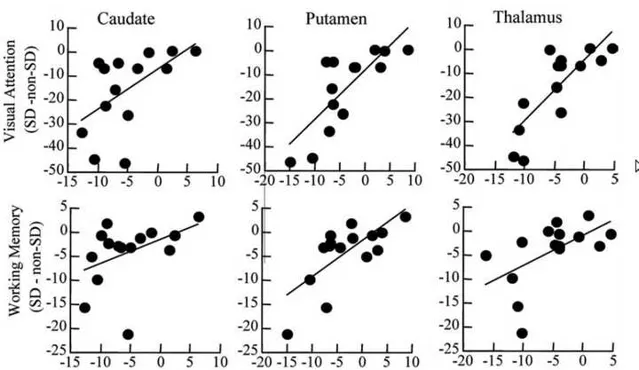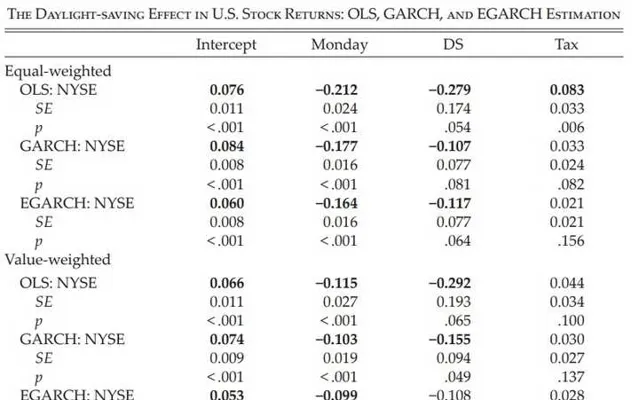簡單說就是神經系統的正常代償。在短期熬夜之後,人類大腦中的多巴胺水平會有一定的增加 [1] , 而多巴胺轉運體則不受影響:

這種機制有助於在臨時性(非經常性/規律性的)熬夜情況下保持大腦的興奮水平,在生物的演化過程中具有重要的意義 [2] . 但是,需要註意的是,這種代償不會抵消掉由於疲勞導致的認知能力和行為能力的下降 [1] 。具體表現在與認知/行為相關的視覺註意和工作記憶 都跟這種代償的強度負相關 [1] [3] [4] :

所以,我們在臨時性的熬夜之後會覺得更興奮,在這種感覺下,我們可能會覺得不累,工作效率也沒有降低,但是這些感覺都只是「假象」。在這些假象的迷惑之下,我們大腦的理性決策功能和情緒認知功能都會被擾亂 [5] [6] [7] [8] [9] . 做出明顯錯誤的決策、情緒感知異常、情緒表現異常 在臨時性熬夜情況下會變得更加常見,也意味著更大可能的經濟損失風險和人際關系風險 [10] [11] [12] [13] [14] .
這一決策能力降低導致的損失甚至能直接體現在股票投資上,比如股票收益的夏令時效應:夏令時後第一個周一的股票收益要顯著低於其他周一的股票收益: [15]

參考
- ^ a b c Sleep deprivation decreases binding of [11c]raclopride to dopamine d2/d3 receptors in the human brain. Journal of Neuroscience the Official Journal of the Society for Neuroscience, 28(34), 8454.
- ^ Volkow, N. D. , D Tomasi, Wang, G. J. , F Telang, Fowler, J. S. , & Logan, J. , et al. (2012). Evidence that sleep deprivation downregulates dopamine d2r in ventral striatum in the human brain. Journal of Neuroscience the Official Journal of the Society for Neuroscience, 32(19), 6711.
- ^ Goel, N. , Rao, H. , Durmer, J. , & Dinges, D. . (2009). Neurocognitive consequences of sleep deprivation. Seminars in Neurology, 29(04), 320-339.
- ^ D Tomasi, Volkow, N. D. , Wang, G. J. , Wang, R. , Telang, F. , & EC Caparelli, et al. (2011). Methylphenidate enhances brain activation and deactivation responses to visual attention and working memory tasks in healthy controls. Neuroimage, 54(4), 3101-3110.
- ^ Pezze, M., A. , Feldon, & J. (2004). Mesolimbic dopaminergic pathways in fear conditioning. PROGRESS IN NEUROBIOLOGY -PERGAMON PRESS-.
- ^ Yoo, S. S. , Gujar, N. , Hu, P. , Jolesz, F. A. , & Walker, M. P. . (2007). The human brain without sleep—a prefrontal amygdala disconnect. Current Biology, 17(20), R877-8.
- ^ Goel, N. , Rao, H. , Durmer, J. , & Dinges, D. . (2009). Neurocognitive consequences of sleep deprivation. Seminars in Neurology, 29(04), 320-339.
- ^ Walker, M. P. . "The role of sleep in cognition and emotion. " Annals of the New York Academy of Sciences 1156(2010):168-197.
- ^ Killgore, W. . (2010). Effects of sleep deprivation on cognition. Progress in Brain Research, 185(1), 105-129.
- ^ Harrison, Y. , and J. A. Horne . "The impact of sleep deprivation on decision making: a review. " J Exp Psychol Appl 6.3(2000):236-249.
- ^ Fullagar, H. , Skorski, S. , Duffield, R. , Hammes, D. , Coutts, A. J. , & Meyer, T. . (2015). Sleep and athletic performance: the effects of sleep loss on exercise performance, and physiological and cognitive responses to exercise. Sports Medicine, 45(2), 161-186.
- ^ Wickens, C. D. , Hutchins, S. D. , Laux, L. , & Sebok, A. . (2015). The impact of sleep disruption on complex cognitive tasks: a meta-analysis. Human Factors The Journal of the Human Factors and Ergonomics Society, 57(6), 930-946.
- ^ Venkatraman, V. , Huettel, S. , Chuah, L. , Payne, J. W. , & Chee, M. . Sleep deprivation biases the neural mechanisms underlying economic preferences. Social Science Electronic Publishing.
- ^ Spear, L. P. . (2011). Rewards, aversions and affect in adolescence: emerging convergences across laboratory animal and human data. Developmental Cognitive Neuroscience, 1(4).
- ^ Kamstra, M. J. , Kramer, L. A. , & MD Levi. (2010). Effects of daylight-saving time changes on stock market volatility: a comment. Psychological Reports, 107(3), 877-887.











